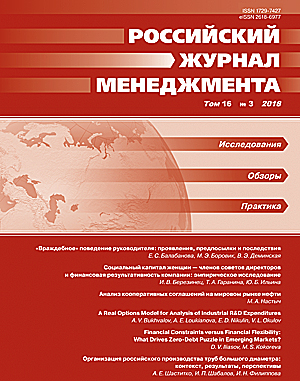Abusive Supervision: Manifestations, Antecedents, and Consequences
DOI:
https://doi.org/10.21638/spbu18.2018.301Abstract
The authors examine manifestations, individual and organizational antecedents and consequences of abusive supervisor behavior which is defined as regular humiliating, suppressive, rude and insulting day-to-day practices towards subordinates. Empirical analysis is based on the online survey of 198 employees from private and public organizations. We found, first, that abusive supervision in Russian organizations is most often manifested in coercion to do routine and unqualified work tasks; ignoring of subordinates’ ideas and initiatives; public critique in an insulting manner; cheating subordinates. Second, our investigation shows that respondents attribute such behavior to demonstration of power or to supervisors’ poor communicative skills. Third, we revealed that the strongest predictor of abusive supervision was employee’s economic dependence, namely, the reward system depending rather on personal leader-employee relationships than on objective performance indicators. Forth, abusive supervision considerably decreases employees’ job satisfaction and work engagement, contributes to burnout and intentions to quit.
Keywords:
abusive supervision, dark side of leadership, destructive leadership, power relations in organization, economic dependence
Downloads
References
Translation of references in Russian into English
Downloads
Published
How to Cite
Issue
Section
License
Articles of the Russian Management Journal are open access distributed under the terms of the License Agreement with Saint Petersburg State University, which permits to the authors unrestricted distribution and self-archiving free of charge.





